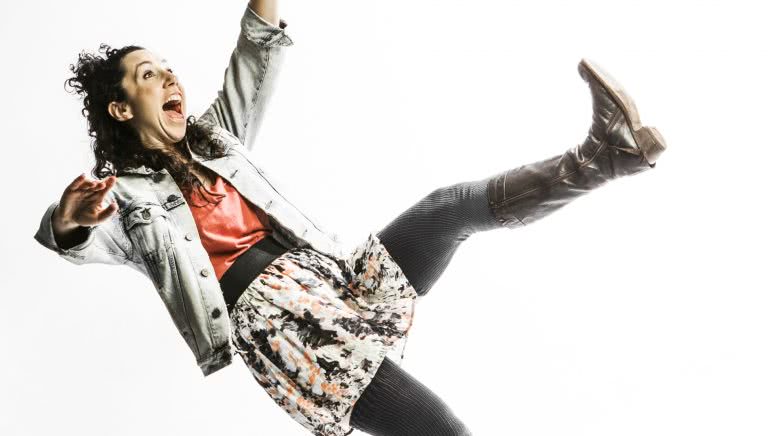When I call Alice Ansara, I’m interrupting her lunch break during rehearsals for Jump For Jordan, the 2013 Griffin Award-winning play soon premiering at the Stables Theatre. I have images of a flustered actor scoffing down a muffin and coffee with one hand, the other crammed with pages of script, trying to answer the phone. Turns out, Alice is gregarious and relaxed, having just finished a hearty serving of mum’s lasagne – “to keep alive that ethnic stereotype” – and happy to talk about her current role, bleeding gums, and how being a child actor weirdly didn’t lead to sex and drugs.
When you start your career barely out of kindergarten, it’s easy to imagine becoming disenchanted. We’ve all seen the grim trajectories of Britney Spears and her ilk, but Alice has managed to avoid the wreck and ruin, and after an opening night is more likely to be found cleaning her house than raising hell out on the town.
“My first audition was when I was six years old,” she reflects, “and I remember my mum saying, ‘Oooh, I don’t think this is such a good idea, you’re going to grow up to be an actor and all actors are alcoholics’. I don’t know about it being a good idea, but I can at least safely say that I’m not an alcoholic. You know when you’re young, every week you wanted to be a different thing. One week it’s hairdressing, the next something else – for me it was carpentry, that one stayed with me for a long time, I had a little toolbox – and then one week it was acting, which happened to coincide with that audition. I ended up getting the job … and now, I’m still in the game. I’m just happy to be a somewhat working actor. I think it’s extraordinarily lucky to be working at all. And still not an alcoholic, oh yeah.”
And working not just anywhere, but the Stables, one of Sydney’s most consistently quality theatres. Alice is in rehearsals to play Sophie, a second-generation Australian who must hide her true self from visiting family. The character is still being developed as the script undergoes rewrites, and I wonder what Alice does differently between classic roles and still-emerging ones.
“I think in classic texts the characters still have to sing, they still have to be alive just as they would in a contemporary Australian play. I always start with the shoes. In these rehearsals I’ve had these outrageously squeaky shoes, and yesterday we were doing a scene where I have to say ‘I wish you weren’t dead.’ And it came out as ‘I wish (squeak) you weren’t (squeak) dead (squeak)!’ So I haven’t quite got the shoes working there yet. While I don’t think that contemporary Australian plays are quite the same as Shakespeare, or Chekov or Ibsen, there’s still scope for the sorts of themes that are brought up in the classics. Family, identity, uncovering masks, history.”
Given how closely Alice is working with the script, you imagine that her character must seem particularly real to her. After doing whatever it takes to make you leave yourself behind and become someone new, it must be difficult leaving that character behind at the end.
“You know,” Alice laughs, “I really try to shy away from being a wanky actor, I feel really embarrassed by anything that points me in that direction. But … some characters really stay with you. I’ll read the script and just feel it viscerally; I’ll feel it in my body in a way. Others take a much longer time. My role inBogan Pride(the Rebel Wilson vehicle) was as the best friend, a really, really daggy character who was always getting sick, and I just got so involved in that character that I was sick for the entire shoot. I had a wonderful time, but like, my gums started bleeding for no reason, and I had these colds that just wouldn’t go away, I got these strange blisters … So, yeah. I really get into character.”
Jump For Jordanis on atSBW Stables fromFebruary 14 until March 29.



































